Diplomatic efforts benefit economy
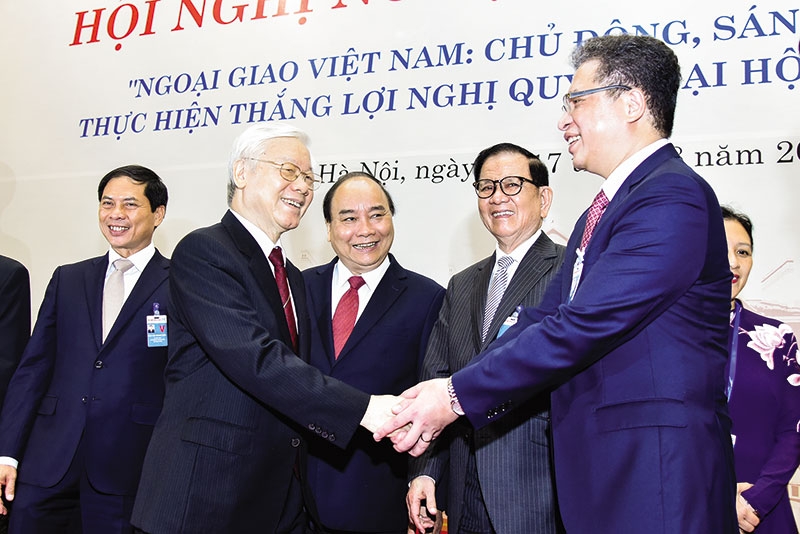 |
| Last Monday, Vietnam’s top leaders highlighted big diplomatic achievements at the 30th Diplomatic Conference |
On August 12-17, Hanoi witnessed Vietnam’s largest-ever diplomatic conference, with the participation of over 1,000 delegates. This year, the biennial conference, which was initiated in 1957, discussed issues relating to economics, trade, investment, defence and security, culture and society, and the Party’s and the state’s foreign policies.
The conference, themed “Vietnam’s diplomacy: proactiveness, innovation, and effectiveness towards successfully implementing Resolutions of the 12th National Party Congress,” was organised against a backdrop of rapid changes on the world stage, as Vietnam is strongly boosting its international integration with a focus on promoting its image and position in the global arena, attracting investment, and expanding trade networks.
Great strides
Prime Minister Nguyen Xuan Phuc stated that by implementing the proactive policies on international economic integration of the Party and the government, with support from the diplomatic corps, Vietnam has gradually expanded and deepened its relations with many nations to amplify its trade networks and attract more foreign resources such as foreign direct investment (FDI) and official development assistance (ODA).
“The Ministry of Foreign Affairs (MoFA) has implemented many activities with good results. Vietnam is the sole ASEAN nation to have a strategic partnership and a comprehensive partnership with all five permanent member nations of the UN Security Council, with all G7 nations, and with 13 of the G20 nations,” PM Phuc said. “These are Vietnam’s biggest trade and investment partners. The five permanent members of the Security Council and the G7 nations last year accounted for 27 per cent of Vietnam’s total FDI and 50 per cent of the country’s total trade turnover.”
Vietnam’s total export-import turnover hit a record figure of $425 billion last year and $264.32 billion in the first seven months of the year. As of July 20, 128 nations and territories invested in Vietnam, with total registered capital of over $333 billion. According to the Ministry of Planning and Investment (MPI), Vietnam has had more than 50 bilateral and multilateral donors, with the total committed ODA fund of $84.4 billion for the country. Of this, 64.4 per cent has been disbursed, greatly contributing to the nation’s economic development. “The diplomatic corps, which have been actively seeking more ODA for Vietnam, have contributed greatly to this achievement,” said Minister of Planning and Investment Nguyen Chi Dung.
The MoFA also reported that diplomatic activities have contributed to helping Vietnam attract a large sum in overseas remittances, reaching $11.88 billion in 2016 and $13.78 billion last year. “Over the past two years, the corps has mobilised another nine nations to recognise Vietnam as a market economy, raising the total number of these nations to 71,” said MoFA Deputy Minister Bui Thanh Son.
2017 was the most successful year in the country’s diplomacy, helping promote Vietnam’s international image. Most notably, Vietnam hosted APEC 2017, organising 243 different activities which culminated in the APEC Economic Leaders’ Week in the central city of Danang. “The success of APEC 2017 has generated new confidence, new power, and new momentum for the country’s international integration, and promoted national pride, self-reliant spirit, and the desire of Vietnam’s people and business community to better themselves,” said Deputy Prime Minister and Minister of Foreign Affairs Pham Binh Minh.
Strength from FTAs
According to DPM Minh, Vietnam’s great growth potential, and its strong efforts in reform and integration and in building a facilitating government, have helped strengthen the country’s economic ties with its partners.
Over the past years, Vietnam has boosted the negotiation and signing of free trade agreements (FTAs). To date, the country has joined 16 FTAs, including seven signed as a member of the ASEAN; five FTAs signed bilaterally with Chile, Japan, South Korea, the Eurasian Economic Union (Armenia, Belarus, Kazakhstan, Russia, and Kyrgyzstan), and the Comprehensive and Progressive Agreement for Trans-Pacific Partnership (CPTPP); and four FTAs currently under negotiation, including the Regional Comprehensive Economic Partnership (RCEP), the EU-Vietnam FTA (EVFTA), the FTA with the European Free Trade Association, and the Vietnam-Israel FTA.
As part of these FTAs, import tariffs on almost all goods and services will be reduced or erased over specified periods of time, prompting member states to boost their trade and investment within the trade blocs.
Diplomats told VIR that, in addition to Vietnam’s great potential from growing consumption, high economic growth, and lower production costs, the FTAs will help Vietnam lure in more FDI.
“As global economic connectivity is increasing, and with FTAs such as the CPTPP, EVFTA, and RCEP coming into force in the future, South Korean companies are exploring more opportunities in Vietnam to expand their performance here,” said Woohyuk Choi, commercial counsellor of the South Korean Embassy to Vietnam.
It is expected that South Korean companies will boost their investment in many sectors in Vietnam, particularly fintech, thanks to the domestic market’s expansion furthering the development of the consumer goods sector as well as the domestic financial market and the e-commerce market’s potential given the country’s 62-per-cent wireless telecommunications uptake. “In addition to these areas, South Korean energy companies will also actively invest in new power generation, with the construction of renewable energy plants and supply of energy-saving equipment,” Choi said.
As of July 20, South Korea was Vietnam’s biggest foreign investor, with 7,080 valid projects registered at $61.51 billion.
According to Umeda Kunio, Japanese Ambassador to Vietnam, Vietnam’s attractiveness as an investment destination is due to its market potential, relatively competitive and diligent workforce, and political stability. “Based on several economic forecasts, Vietnam’s economic growth is predicted to remain high in 2018, and Japanese investments this year are also expected to be at a high level,” Kunio said.
As of July 20, Japan was Vietnam’s second-largest foreign investor, with 3,835 valid projects registered at $55.86 billion.
Key tasks ahead
DPM Minh stressed that in 2018 and beyond, Vietnam’s diplomatic corps will continue implementing all tasks, building on the great successes of APEC 2017 and of Vietnam’s bilateral and multilateral relationships, so that Vietnam can expand its trade networks and attract more foreign capital sources.
The MoFA’s calculations showed that Vietnam’s total export turnover in 2016 and 2017 was concentrated in six localities which had over $10 billion in turnover per year each. More than 90 per cent of the remaining localities occupied only 30 per cent of the total national export turnover. Some localities even had zero export turnover.
Besides, only six out of 63 cities and provinces received FDI in excess of $500 million per year each, making up 90 per cent of Vietnam’s total FDI.
“Up to 47 localities hold only about 10 per cent of Vietnam’s total FDI,” DPM Minh said. “We should review the situation so as to have proper solutions, both in the short and the long term,” he stressed.
According to Minister Dung, in the future, the diplomatic corps should focus more on economic activities, especially considering the developments of Industry 4.0. “Vietnam’s favourable business climate must be promoted to foreign investors, especially big foreign groups,” he said.
Echoing this view, Deputy Minister Son stressed that the diplomatic corps will need to boost the attraction of new-generation FDI into the sectors prioritised for development by Vietnam, such as high-technology, smart agriculture, and sea-based economic development.
| Nguyen Phu Trong - Party General Secretary
Over the past three years and especially in 2017, Vietnam’s diplomatic efforts have led to several important achievements which have taken centre stage among the country’s overall successes. These efforts have made an important contribution to maintaining and strengthening the peaceful and stable environment and facilitating national construction and protection. Diplomacy has effectively served Vietnam’s economic development, especially its external economic development. Since 2016, Vietnam has seen higher annual economic growth than the average of the 2011-2015 period, while all macro-economic indicators have been positive, especially foreign investment and import-export turnover. Notably, though protectionism is rising in many countries worldwide, Vietnam’s attracted investment, export turnover, and tourist arrivals from key partner nations keep increasing from year to year. The total foreign direct investment in 2017 hit $35.88 billion, up 44.4 per cent on-year, a 10-year record, $17.5 billion of which was disbursed, which is up 10.8 per cent over 2016. Besides, international donors also committed more than $3 billion in official development assistance to Vietnam until 2020. The number of foreign tourist arrivals to Vietnam hit a record 13 million last year, while 71 countries have recognised Vietnam’s economy as a market economy. International economic integration has continued, providing more resources for the country’s economic development. Diplomatic activities have continued to play an important role in enhancing Vietnam’s global position and deepening and consolidating its relations with other nations, especially prioritised and important partners. The country has also boosted international integration in all fields and continued taking an active role in regional and global institutions, notably including its participation in constructing the strong, co-operative, and self-reliant ASEAN community. These achievements have proved that the foreign policy set by the 12th Party National Congress and the Party’s relevant policies related to foreign affairs are correct. Vietnam always pursues a consistent foreign policy of independence, self-reliance, peace, co-operation and development, multilateralising and diversifying relationships, and proactively integrating into the world. Pham Quang Vinh - Deputy Minister of Foreign Affairs, former Ambassador to the US
The US is one of the biggest trade and investment partners of the entire region, including Vietnam. Currently, the US is Vietnam’s ninth largest foreign investor. However, US investment is different from that sourced from many other nations. Specifically, it has been able to greatly stimulate the relationship between Vietnam and the US in all sectors. It has also created a big impetus for a rise in investment of multi-national corporations and US companies, and even of investors from other nations, into Vietnam. As US companies invest in Vietnam, they show their confidence in this market. That is why, over the past years, the US has continued being an important investment source for Vietnam. Thus, we must understand this special US investment characteristic and promote Vietnam’s pro-business and pro-investment climate, which is in line with international practices and laws as well as with the rules set by the World Trade Organization. We also promote the fact that Vietnam has been increasingly boosting its international integration, including its participation in regional, bilateral, and multilateral free trade agreements, which have contributed to creating a more friendly business climate. During our meetings with many major US groups and investors, we saw that they have been paying attention to our country’s development and even felt quite excited about doing business and investing in Vietnam. They consider Vietnam an attractive and stable investment destination with a growing role in the region. US investment in Vietnam began in the mid-1990s, after the two sides forged official diplomatic relations in July 1995. Major US companies such as Coca-Cola and Intel have invested in Vietnam. They told us that they will not only stay in the country, but will also continue and expand their long-term investments. We also see that both economies have advantages and strengths that can supplement each other. Tao Thi Thanh Huong - Ambassador to Singapore
Since 1996, Singapore has been one of Vietnam’s most important trade partners. Currently, Singapore is Vietnam’s second largest trade partner within the ASEAN and the eighth largest trade partner in the world. Total bilateral trade turnover in 2017 climbed by 8.9 per cent against 2016, to reach $8.3 billion. Singaporean direct investment capital into Vietnam has also continuously risen. Singapore is the biggest ASEAN investor and third-largest foreign investor in Vietnam. As of late May 2018, Singapore had 2,048 investment projects in Vietnam, registered at $43.53 billion. Singaporean investments used to be found only in locations with favourable infrastructure and economic conditions like Ho Chi Minh City, Hanoi, Haiphong, Binh Duong, and Bac Ninh. However, over the past few years, investments spread out into many other provinces like Quang Ngai, Quang Tri, Nghe An, Thai Nguyen, Thanh Hoa, and Binh Dinh. Notably, the Vietnam-Singapore Industrial Parks (VSIP), co-invested by Sembcorp over the past 20 years, have become a symbol of successful economic ties with mutual benefits for both nations. In the near future, Vietnam and Singapore’s economic co-operation may receive a new impetus. Vietnam needs to boost co-operation with Singapore in sectors which are the former’s strengths so as to increase the added value for its own economy, develop more stably, digitalise its economy, apply high-technology, as well as develop smart cities and the sectors of e-services and banking. Ngo Tien Dung - Ambassador to Spain
Vietnam is a key ASEAN trade partner for Spain. The two nations’ two-way trade turnover has annually increased by an average of 15 per cent over the past 10 years, to reach over $3 billion in 2017. The two nations have set the target of raising the figure to $5 billion by 2020. Spain also prioritises its co-operation with Vietnam in official development assistance. It has earmarked over $300 million for bilateral and multilateral co-operation projects over the past 10 years. Currently, Spain still provides about $350 million for infrastructure projects in Vietnam, including Metro Line 5 in Ho Chi Minh City. This is expected to create a strong impetus for luring major Spanish investors to Vietnam. Currently, Spanish direct investment into Vietnam remains limited, with the country ranking 14th out of 19 EU nations investing in Vietnam. However, this investment is likely to increase in the near future. For example, Repsol, one of the world’s leading energy groups, has invested in Vietnam, Premo Group has established a state-of-the-art plant to produce electronics spare parts in Danang, and Getinsa Group has provided consultancy for the construction of the Noi Bai-Lao Cai Expressway. Spanish investors are showing increasing interest in Vietnam. Their experience in the sectors of renewable energy, infrastructure, tourism, high-technology, construction, and architecture will make valuable contributions to Vietnam. Ngo Duc Manh - Ambassador to Russia
The economic, trade, and investment co-operation between Vietnam and Russia continues developing dynamically. Co-operative projects in the oil and gas sector have been effectively implemented in both nations. The Vietsovpetro joint venture established in 1981 has continued being a symbol of Vietnamese-Russian co-operation and a pillar of the oil and gas exploration and exploitation sector of Vietnam. The expansion of co-operation in the sector of automobile assembly and manufacturing promises to create further positive changes in the Vietnamese-Russian economic relationship. Since the free trade agreement between Vietnam and the Eurasian Economic Union took effect in October 2016, the two nations’ bilateral trade turnover has soared by an average of 30 per cent per annum. According to Russian statistics, the figure hit a record $5.2 billion last year. According to Vietnamese statistics, in the first half of this year, the figure reached $2.3 billion, up 42 per cent on-year. In terms of investment, Russia had 117 valid investment projects in Vietnam as of June 2018, registered at almost $1 billion. Meanwhile, Vietnam had 22 investment projects in Russia, with the total registered capital of nearly $3 billion. Notably, Vietnam’s TH Group has invested $2 billion in high-tech concentrated dairy and fresh milk production projects in Russia’s Moscow and Kaluga oblasts. This is a major highlight in the investment co-operation between both nations. Le Huy Hoang - Ambassador to Mozambique
Over the past few years, Vietnam has made major efforts to boost its economic ties with African nations, with Mozambique being a focus. Vietnam has closely cemented its co-operation with Mozambique in many sectors, including the telecommunications sector. Vietnamese companies’ total investment capital in Mozambique has risen to nearly $1 billlion. Movitel, a joint venture between Vietnam’s Viettel Group and a Mozambican partner, has invested over $600 million in Mozambique. The joint venture has already begun to turn profit. Vietnamese companies see a multitude of opportunities to do business in Mozambique in many sectors, such as agriculture, fishery, and forestry. I think that besides telecommunications, in the future we need to further our agricultural co-operation with Mozambique. Recently, we established a project worth over $2 million to support the country. Also, we need to boost co-operation with Mozambique in forestry and fishery. |
What the stars mean:
★ Poor ★ ★ Promising ★★★ Good ★★★★ Very good ★★★★★ Exceptional
 Tag:
Tag:
Related Contents
Latest News
More News
- EU and Vietnam elevate relations to a comprehensive strategic partnership (January 29, 2026 | 15:22)
- Vietnam to lead trade growth in ASEAN (January 29, 2026 | 15:08)
- Japanese business outlook in Vietnam turns more optimistic (January 28, 2026 | 09:54)
- Foreign leaders extend congratulations to Party General Secretary To Lam (January 25, 2026 | 10:01)
- 14th National Party Congress wraps up with success (January 25, 2026 | 09:49)
- Congratulations from VFF Central Committee's int’l partners to 14th National Party Congress (January 25, 2026 | 09:46)
- 14th Party Central Committee unanimously elects To Lam as General Secretary (January 23, 2026 | 16:22)
- Worldwide congratulations underscore confidence in Vietnam’s 14th Party Congress (January 23, 2026 | 09:02)
- Political parties, organisations, int’l friends send congratulations to 14th National Party Congress (January 22, 2026 | 09:33)
- Press release on second working day of 14th National Party Congress (January 22, 2026 | 09:19)

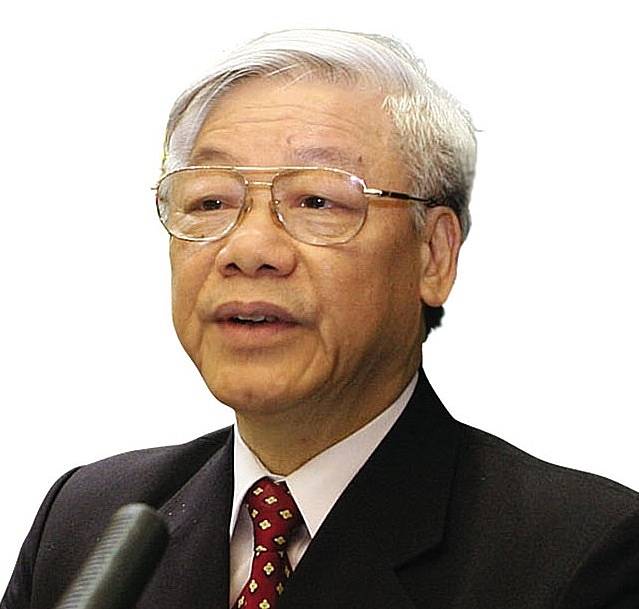
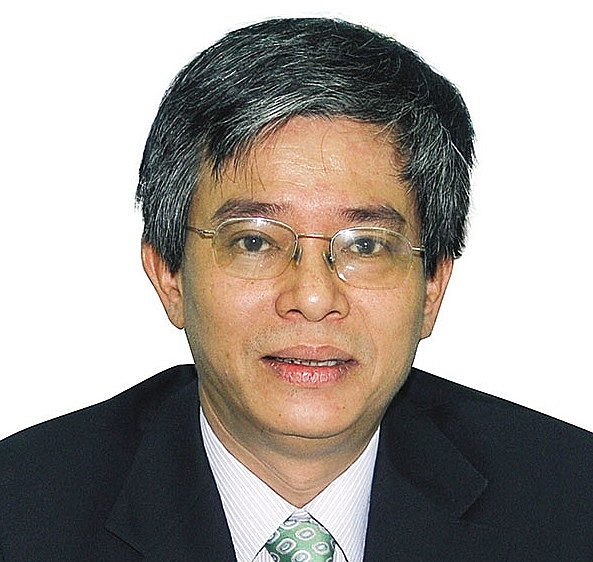
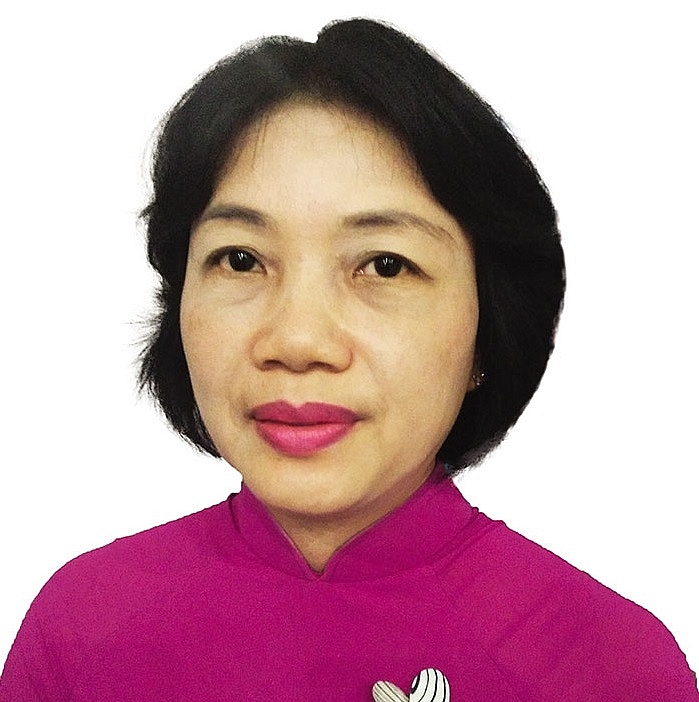
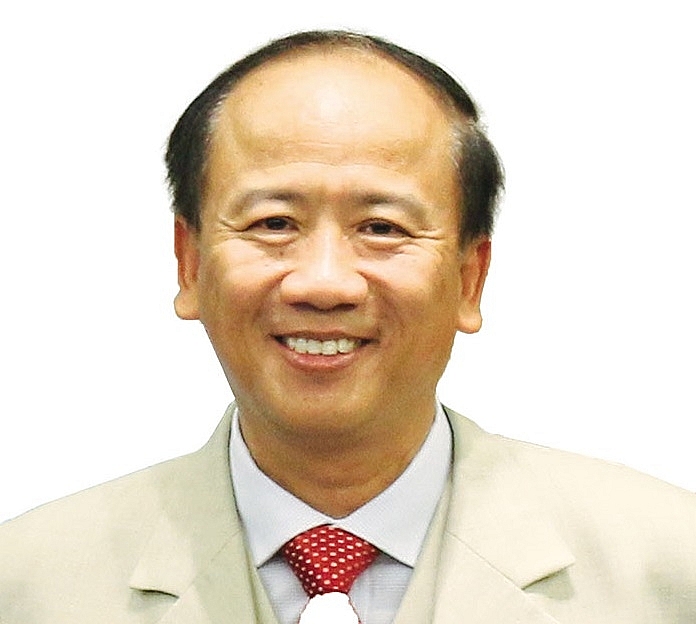
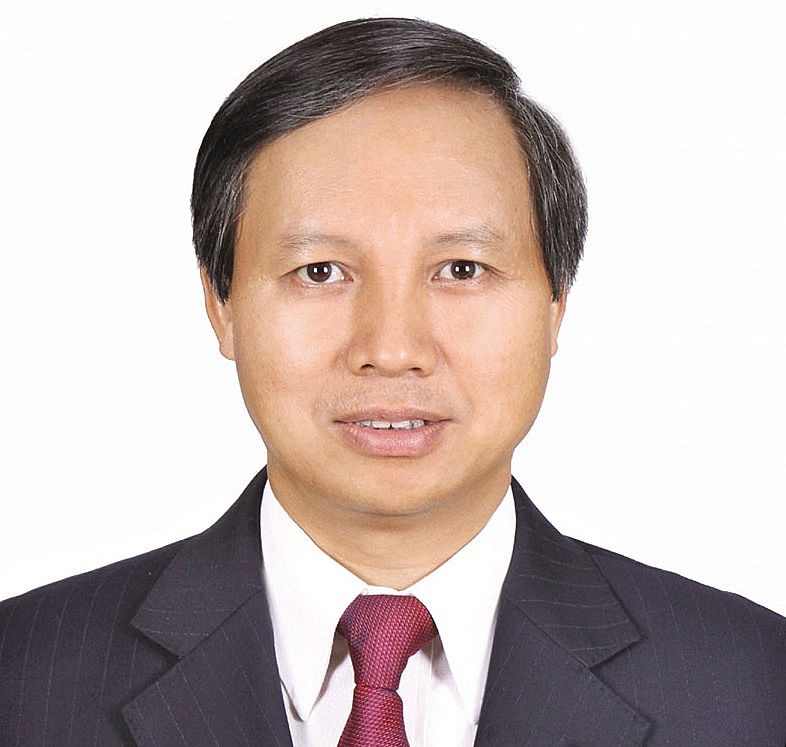
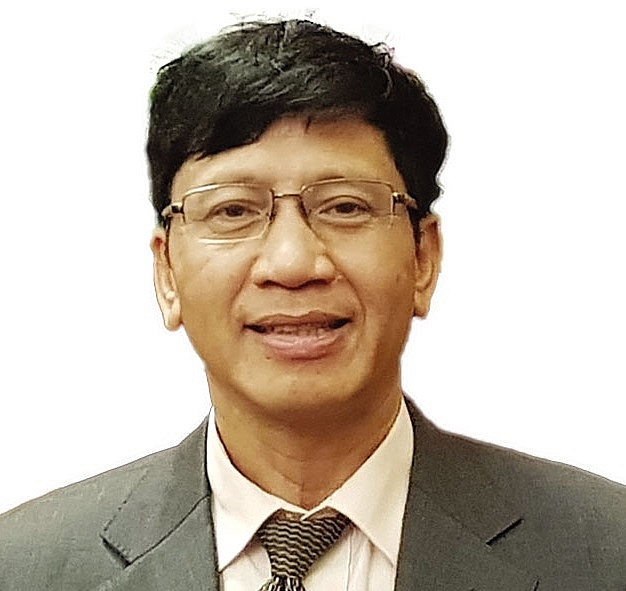


















 Mobile Version
Mobile Version